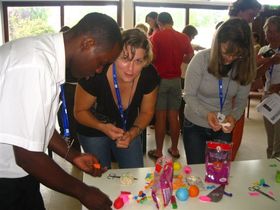ATTE
Advanced Training for Trainers in Europe
The training course was an advanced training for trainers already active in training youth multipliers at the European level.
Main characteristics:
- It was a long-term engagement (2-year duration with various additional training elements).
- It was an advanced training, a high-level course for experienced professionals.
- It was a part-time, continuing training programme based on open and distance learning punctuated by face-to-face intensive course models.
- It contained innovative elements: Mentoring, Peer Support Groups, Personal Development Plans, Open Learning Community, Practice projects.
-
There were 8 projects developed by participant-trainers. Several of these project received support from Action 5 and the European Youth Foundation.
Quality standards, training competencies and validation and assessment were three important aspects of the course. - Being a pilot framework, the course was thoroughly evaluated by an external evaluator. The evaluation report will be published soon.
- Participant-trainers of ATTE developed a "Training Quality Product" (TQP) as a contribution to quality in European Youth Training.
Learn more about ATTE...
ATTE Participants
Download the list of Participants

Specifically, participants
- had international experience with a function of responsibility (not only as a participant), preferably in the youth field;
- had relevant experience as trainers (not only as training organisers), preferably at European or international level and preferably in the youth field;
- had acquired a basic knowledge of the programmes of the Council of Europe and of the European Union in the youth field prior to the beginning of the course;
- had the potential and need to further develop their training competencies and act as a European level trainers in the youth field;
- were committed to develop and implement training activities, with special emphasis on European Citizenship, within the programmes of the Council of Europe and the European Union in the youth field;
- developed and implemented training projects together with other course participants as part of this training course;
- were open and have the potential to be partners in a European level training project;
- were supported by an organisations, associations or institutes – governmental or non-governmental;
- were able to work well in English as trainers and have basic skills to communicate in another European language;
- were motivated to contribute to the learning process of the training course;
- were committed to attend for the full duration and in all elements of the course.
There were 30 participants altogether.
They all came from the Member States of the Council of Europe and the European Union and from other states signatory of the European Cultural Convention [1].
1 - next to the 47 Member States of the Council of Europe, the following counties are signatories of the European Cultural Convention: Belarus, Bosnia-Herzegovina, Holy See, FR Yugoslavia
